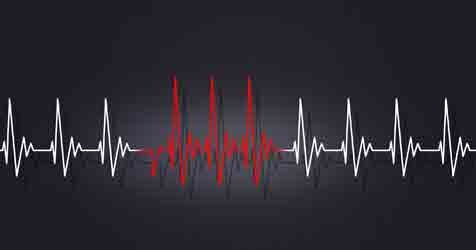
ARRHYTHMIA: TYPES OF HEART BEATS
Thursday, October 24, 2019WHAT IS AN ARRHYTHMIA?
An arrhythmia is an abnormal heart rhythm. It may feel like fluttering or a brief pause. It may be so brief that it doesn’t change your overall heart rate (the number of times per minute that your heartbeats). Or it can cause the heart rate to be too slow or too fast.
WHAT IS A NORMAL HEARTBEAT?
A "normal" heart rate is defined as anywhere from 60 to 100 beats per minute at rest. The range of normal, counting sleep and daytime activities, is around 45-95.
WHAT ARE THE TYPES OF HEART RATES?
Slow heart rates are called " bradycardia ", and fast heart rates are known as "tachycardias".
WHAT IS BRADYCARDIA?
In this condition, the sinus node sets the pace for the rest of the heart just like it usually does, but it does it more slowly than usual.
However, this slowing of the heart rate can also be abnormal. If the rate is too slow for a given person, then symptoms such as light-headedness or passing out ("syncope") may occur. Patients may have symptoms of congestive heart failure or may experience chest pains.
Some of the conditions associated with abnormal sinus bradycardia include the "sick sinus syndrome" (which is also discussed more fully below), a condition in which different parts of the conduction system appear to simply "wear out". Slowing of the heart rate can be caused by conditions outside of the heart such as low thyroid. Marked slowing of the heart rate during sleep is one of the symptoms of obstructive sleep apnoea.
Slow heart rates can be caused or worsened by medications.
The treatment involves correction of any underlying conditions which may exist (such as supplementing the thyroid) and reducing or discontinuing any drugs which may be worsening the problem. If persistent bradycardia and symptoms are present, a pacemaker may be indicated.
WHAT IS TACHYCARDIA?
This is the condition where the sinus node starts the heart going at a more rapid rate (by definition, over 100 beats per minute). It is a normal response to increased demands on the heart, such as exercise or other stress.
Tachycardia can also be caused due to:
- Infections and fevers.
- It may also be associated with conditions such as high thyroid or dehydration.
- "Anaemia" (decreased amounts of oxygen-carrying cells in the blood)
- Patients with heart failure or other heart conditions
- Poor physical conditioning
- Caffeine which is found in coffee, tea (hot or iced), many carbonated beverages, and over-the-counter medications (some pain relievers, agents sold to prevent drowsiness). Chocolate contains significant amounts of stimulants.
- Nicotine and other stimulants and toxins in cigarettes, cigars, snuff and other tobacco products.
WHY KIMS?
KIMS, one of the best cardiology hospitals in Hyderabad, offers a breadth and depth of experience that has earned it international recognition for the diagnosis and treatment of virtually every type of cardiac rhythm disorder, including atrial fibrillation and atrial flutter, bradycardia, genetic heart rhythm disorders, heart murmurs, ventricular arrhythmias, and supraventricular arrhythmias. All of our best cardiology specialist doctors in Hyderabad are experts in cardiology and clinical cardiac electrophysiology and have trained at nationally renowned centres of excellence in cardiac electrophysiology. Our best cardiac specialist doctors In Hyderabad offer clinical expertise in implantable devices and advanced ablation.
